We hear that the iconic London star of Fiddler on the Roof was in the audience to see Bryn Terfel on opening night at Grange Park Opera.
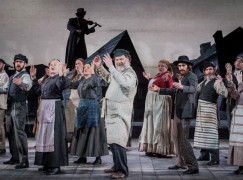
First review just in, here.
We hear that the iconic London star of Fiddler on the Roof was in the audience to see Bryn Terfel on opening night at Grange Park Opera.

First review just in, here.
The Latvian mezzo Elina Garanca has pulled out at very short notice due to a serious illness in the family.
She is replaced as Santuzza in a new staging of Cavalleria rusticana by the Lithuanian, Violeta Urmana.
Luxury recasting. Opening night June 12.
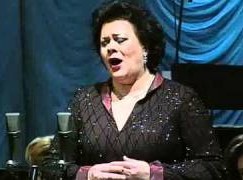
Tong Chen, a former assistant conductor of the Shanghai Opera, has been named music director in the fourth largest city in New York state. She teaches at NY City University.
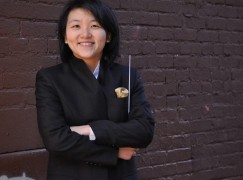
Temple University has appointed a new music professor and artistic director, a full-time, year-round job.
He is the German conductor Andreas Delfs, formerly music director of the Milwaukee Symphony Orchestra (1997 -2009) and the St. Paul Chamber Orchestra.
It’s highly unusual for an active conductor to move in mid-career to an academic post. Delfs, 55, gets to conducts seven concerts a year with the university orchestra. And he’s available if anyone drops out at the Philadelphia Orch.
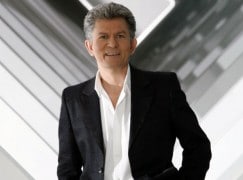
The South Korean tenor Keonwoo Kim took first prize (C$30,000) and his compatriot soprano Hyesang Park second at the Montreal international musical competition last night. A Quebec soprano France Bellemare came third.
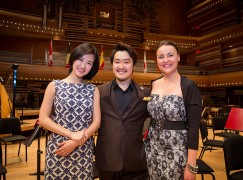
It was after six weeks of learning Madame Butterfly for Opera Holland Park that I knew I no longer had it in me. Singing, and everything associated with it, made me sad. So sad. Nights crying to my ever-supportive boyfriend knowing I just had to make that decision and pull the plug. So I did, and now I don’t sing anymore.

Katie McAdam, a rising soprano on the UK opera circuit, found herself grappling with vocal health issues in the way that many singers do. Only hers would not go away. So Katie took a bold decision, no turning back.
Two years on, she writes about her struggles with a vein of hope and humour that may help others to cope with the widely misunderstood side-effects of a professional singing career.
Read Katie’s story here.
Press release:
During the Chicago Symphony Orchestra’s 2012-13 season, anonymous donors endowed in perpetuity the principal viola chair but requested some time to decide on how they wanted the chair to be named. After quite a bit of thought, the donors have decided upon “The Paul Hindemith Principal Viola Chair, endowed by an anonymous benefactor.”
Hindemith appeared with the Chicago Symphony Orchestra on several occasions, as viola soloist and conductor, between 1938 and 1963.
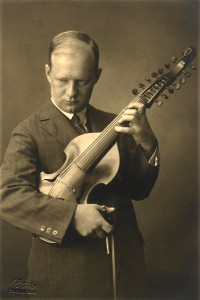
First Atlanta eliminates music from elementary schools. Now the faltering Woodruff Arts Centre is in the process of shutting down its useful and profitable symphony store and opening an airline bar in its place. This report from our correspondent Allen Brown:

Atlanta (Slipped Disc) – In its ongoing desperation for funds, the Woodruff Arts Center has decided to close its profitable Symphony Store and replace it with a Delta Sky Lounge.
The Symphony Store is a profitable gift and souvenir shop with a terrific variety of music-themed and arts-themed items, including T-shirts, home accessories, jewelry, neckties, aprons, greeting cards, books, umbrellas and scarves. The store also sells the entire catalog of ASO recordings, including those from the era of Robert Shaw. The store is part of the concert-goer’s experience, and helps promote the ASO brand with mementos that patrons purchase for themselves or to give as gifts. The merchandise is currently being liquidated. This weekend is the last concert of the season.
Though it’s a bit smaller, the store is far superior in displays and merchandise to the gift shops at the Kennedy Center, Dallas Symphony, and Lyric Opera of Chicago. Many ASO patrons (and orchestra members) are outraged by the decision to end this ASO tradition and replace it with a Delta Sky Lounge.
The decision seems ill-advised for several reasons, not the least of which are the ample food and beverage options in the Robert Shaw Room for donor-subscribers, the 6-8 snack and beverage stations in the Symphony Hall galleria during concerts, as well as the adjacent restaurant, Table 1280, located in the piazza.
It would seem that alcohol sales is the new solution to fundraising. And it would also seem that replacing ASO branding with Delta branding is the way to woo patrons. Don’t we all want to be reminded during our Symphony excursions what a joy it is to be in airports and on airplanes?
WAC and ASO leaders, Virginia Hepner and Terry Neal, are grasping at straws.
*
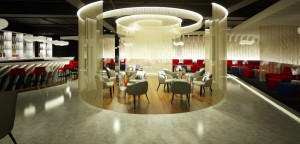
UPDATE: In an unrelated development announced today, Delta are planning to open a similar Sky Lounge in London. This may be part of some ghastly global strategy.
Eugene Drucker, violinist of the Emerson Quartet, had a cathartic experience this week, playing a concerto that his father was stopped from performing. He recounts the experience below in an exclusive article for Slipped Disc.
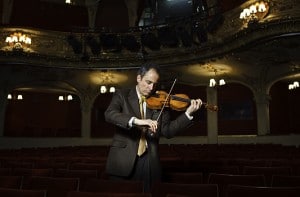
My father’s experience at his graduation concert from the conservatory in Cologne in June 1933 was part of family lore as I grew up. Ernst Drucker was scheduled to play the Brahms Violin Concerto, but one day came to school and found that his name had been crossed off the program. With his teacher Bram Eldering, who as a young man had been close to Brahms and was one of the most famous violin professors in Germany during the interwar period, my father went to the office of the newly installed Nazi administrative director of the conservatory. Eldering threatened to resign if his pupil would not be permitted to perform. A compromise was reached: my father would be allowed to play, but only the first movement of the concerto.
The evening of the concert, as he walked onstage at Cologne’s famous Gürzenich auditorium, my father saw that the first three rows were lined with SA Brownshirts. He was running a high fever but was determined not to cancel; in spite of the ill will that he must have felt from those directly in front of him, he played his best and was praised by his teacher afterward. Several well-established newspapers reviewed his performance enthusiastically. But the Nazi party press organ, the Völkische Beobachter, printed a one-sentence critique: “It is beyond our comprehension that the immortal German violin concerto of Brahms could be entrusted to a Jew.” My father wrote a letter to the editor pointing out that Brahms had dedicated his immortal concerto to the Jew, Joseph Joachim, who advised him on the technicalities of the violin part.
My father had the opportunity to play the entire concerto just a few years later as one of the concertmasters of the Jüdischer Kulturbund, a nationwide organization that allowed German Jews to continue having a cultural life after they had been excluded from mainstream events. This cultural federation, with branches in all the major German cities, offered employment to Jewish musicians, artists, actors and dancers who otherwise would have had no opportunities to practice their art or make a living.
There was an administrative staff that numbered 400 in Berlin alone. The Kulturbund had 60,000 subscribers, whose membership dues paid the salaries of the employees. It also provided an avenue through which German Jews could learn more about their Hebrew and Yiddish heritage. My father always spoke of the Kulturbund as a positive force in his life. It was only after his death that I became aware of questions that some Jewish observers had raised about the organization: did it lull German Jews into a false sense of security because they could hold onto their precious cultural life and even, for awhile, continue to enjoy the noblest manifestations of German culture? Such questions arose largely with the benefit of hindsight; few people could have predicted in the mid-1930s the full extent of the horrors that were to follow. And many of these same German Jews that performed for the Kulturbund and attended its events worked hard and long to obtain the necessary documentation that would allow them to emigrate to the U.S., U.K. or other countries. All the possible destinations had yearly quotas for Jews. Unfortunately, many German Jews did not make it out of the country in time to escape the Final Solution. My father was fortunate enough to emigrate from Germany to the United States with his entire immediate family in September 1938, two months before Kristallnacht.
Martin Goldsmith’s excellent book The Inextinguishable Symphony records the history of the Kulturbund through a personal lens, as both his parents had played in the orchestra in Frankfurt. Based on an interview with me, Mr. Goldsmith included the story of my father’s graduation concert, even though that had nothing to do with the Kulturbund. But as I found out this past week, maybe in a way it did: the restriction of his performance was, on a very small scale, emblematic of what was to come. The curtailment of human liberty in all spheres of activity presages the gravest existential threats. Disenfranchised German Jewry, doomed to exile, fragmentation and death, found a way to hold on to its identity, to continue to celebrate what is beautiful in life even as it looked for a way back from the edge of the abyss.
I played three concerts in Israel last week to commemorate the Jüdischer Kulturbund and my father’s leading role in the federation’s orchestra in Frankfurt during the 1930s. The final event, at the Tel Aviv Museum, featured a panel discussion that preceded a program of chamber and orchestral music. I am grateful to the outstanding cellist Hillel Zori, who invited me to be a key participant; to his brother Nitai, an excellent violinist and violist who played chamber music with me; and to the venerable Noam Sheriff, who sympathetically accompanied me in the Brahms Violin Concerto with the Raanana Symphonette Orchestra.
Though I don’t frequently perform as a soloist, I welcome the opportunity when it arises. The last time I played the Brahms Concerto was in December 2009, with the Jerusalem Symphony Orchestra under the direction of Leon Botstein. Another personal footnote: my novel The Savior, published by Simon & Schuster in 2007, is about an imaginary German violinist caught in a moral dilemma during the final months of the Third Reich. A flashback to 1933 tells the story of my father’s graduation concert as something that happened to the protagonist’s best friend, a young Jewish violinist named Ernst.
(c) Eugene Drucker/Slipped Disc
UPDATE: Tomorrow (Saturday, June 6) Gene’s concerts in Israel commemorating his father’s history will be on two TV news programs “CBS:This Morning:Saturday” (7:00 AM hour EST) and Fox “America News HQ” in the 2:00 PM EST hour.
Manchester Crown Court has been hearing closing arguments in the rape trial of Malcolm Layfield, former violin teacher at Chetham’s and head of strings at the Royal Northern College of Music.
His barrister said: ‘There is a difference between wrong and unlawful, between wrong and rape. It doesn’t follow that one proves the other.’
Read Helen Pidd’s court report here.

Presumptions of innocence apply.
The next stage of degree devaluation has arrived.
The Royal Conservatoire of Scotland has announced the award of an honorary doctorate to the Britain’s Got Talent singer Susan Boyle, of whom circusmaster Simon Cowell famously said ‘she made us look stupid’.
Ms Boyle, 54, said: ‘I am truly honoured to be receiving this doctorate. It is brilliant and I thank the RCS for even considering me, let alone actually awarding me with this great privilege.’
Let us not dwell here on issues of intelligence. Stick to commonsense: what’s the sense of the RCS lowering itself to award its highest degree to a singer with no formal education?
Surely what the RCS is signalling is that there is no point in having an education in music, and that its own existence is redundant.
Or are we missing something here?
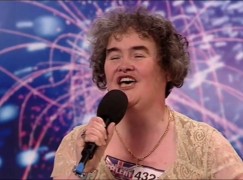
News from Glyndebourne of the safe delivery of a male child to chairman Gus Christie and his wife, the Australian-US soprano Danielle De Niese.
Statement:
Glyndebourne Chairman, Gus Christie, and his wife, soprano Danielle de Niese, are delighted to announce the birth of a son, their first child together.
The little boy was born on 4 June 2015. Both mother and child are doing well.
The couple, who met at Glyndebourne in 2005 when Danielle was starring in Giulio Cesare, married in 2009.
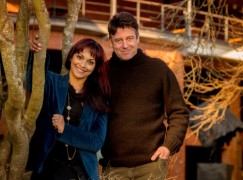
Our warm felicitations to the happy family.
Likely name? George, after Gus’s father, who died a year ago.